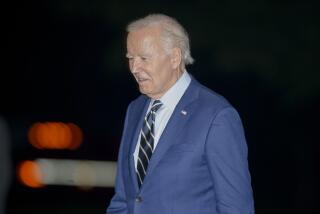Hard-Liners at Arm’s Length as Israel Coalition Talks Start
- Share via
JERUSALEM — Prime Minister-elect Benjamin Netanyahu opened talks with potential partners for a coalition government Monday amid signs that he might be distancing himself from the extreme right wing of his own Likud Party.
Netanyahu’s negotiating team began bargaining with members of the eight political parties that are vying for 18 Cabinet posts, but former Defense Minister Ariel Sharon’s efforts to secure a ministry reportedly were stalled.
Sharon, one of the most hard-line and popular figures within Likud, is said to have wanted either the defense or finance portfolio. When Netanyahu refused to guarantee him either one, the burly retired general declined the prime minister-elect’s request for help with coalition negotiations, and the two ceased talking, Israeli radio and television reported.
Netanyahu allies, meanwhile, seemed to dismiss former Prime Minister Yitzhak Shamir’s statements in an interview published Monday in which the Likud elder statesman urged the 46-year-old leader to resist international pressure to continue with the Israeli-Palestinian peace accords and called for immediate expansion of Jewish settlements in the predominantly Palestinian West Bank.
“The key here is to follow the statements of the prime minister-elect himself,” said Netanyahu’s foreign policy advisor, Dore Gold. “Because this was a direct election, he has greater powers. Netanyahu is the boss, and it is a mistake to look at what a variety of figures are saying.”
Unlike past leaders, Netanyahu was chosen by direct vote Wednesday under a new law that allowed Israelis to cast separate ballots for prime minister and for a party for parliament.
In his victory speech Sunday night, Netanyahu vowed to unify the nation, which last week’s vote showed is deeply divided along ideological and religious lines, and to continue peacemaking with the Arab world. But he offered no details.
Netanyahu has 45 days from the election to form a coalition and win approval from a majority of the 120-seat parliament, called the Knesset. His aides have said he hopes to finish the job by June 17.
*
The Likud leader ran on a ticket of three parties--Likud, Tsomet and the breakaway Gesher, a party founded by Netanyahu’s old rival in Likud, David Levy. Political observers said Levy is virtually certain to become foreign minister in exchange for his party’s votes of support.
Tsomet leader Rafael Eitan, a radical opponent of the Israeli-Palestinian peace accords, reportedly is one of five party leaders vying for the job of housing minister--one coveted because it allows the funneling of construction funds to the Cabinet member’s constituencies.
Three religious parties, Shas, the National Religious Party and United Torah Judaism, flexed their newfound muscle after a strong showing in the election, announcing that they will bargain as a bloc--although all three reportedly are also after the job of religious affairs minister.
Netanyahu met with NRP leader Zevulun Hammer and, apparently irked by how large a role the religious parties want in his government, issued a thinly veiled reminder that time is on his side. “We may have to use all 45 days that we are given,” Netanyahu said. “I cannot set the date when we will finish.”
Netanyahu’s hand is considered to be strong in these negotiations because the parties cannot threaten to go over to the other side--in this case that of the Labor Party--as they did previously, when Israelis cast ballots only for a political party.
*
Also under the new system, if the prime minister-elect fails to win approval, new elections are to be held for parliament as well as for prime minister. The smaller parties that fared well in this vote may not want to take another stab at elections.
Since the election, officials of religious parties have been calling for the closure of restaurants that stay open on the Sabbath, including a McDonald’s.
In a news conference Monday, Jerusalem Mayor Ehud Olmert tried to calm the fears of secular Israelis about the might of the religious parties, which have 25 seats of their own in the Knesset and allies in three religious members of other parties.
Olmert dismissed the McDonald’s threat as posturing.
“They are playing a political game like everyone else. If someone says he wants to close McDonald’s, it’s because he knows it will grab headlines,” Olmert said, adding that McDonald’s and other restaurants open on the Sabbath will probably remain so.
Olmert is among those considered to be a long shot for the post of defense minister.
Other possibilities for that job are Netanyahu’s political godfather, former Defense Minister Moshe Arens; newly retired Gen. Yitzhak Mordechai; and moderate Likud member Dan Meridor, a former Justice Minister.
The 68-year-old Sharon is considered too controversial for the job and apparently too right-wing even for Netanyahu. But he is still powerful enough within the party to expect a Cabinet job of some sort.
*
“Bibi knows that Sharon can make his life difficult,” said television political analyst Yaron Dekel, using Netanyahu’s nickname.
Sharon still calls Palestinian leader Yasser Arafat a terrorist and a murderer and is adamantly opposed to the peace accords. As housing minister, he built 22,000 housing units for Jews in the West Bank from 1990 to 1992.
His critics say that as defense minister, he misled then-Prime Minister Menachem Begin into pushing deep into Lebanon in a disastrous 1982 invasion. They blame him for the fact that Israeli troops stood by while Lebanese militiamen entered Palestinian refugee camps and killed hundreds of men, women and children.
More to Read
Sign up for Essential California
The most important California stories and recommendations in your inbox every morning.
You may occasionally receive promotional content from the Los Angeles Times.













